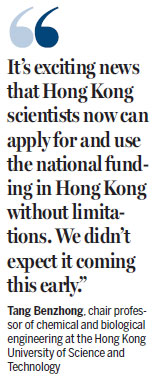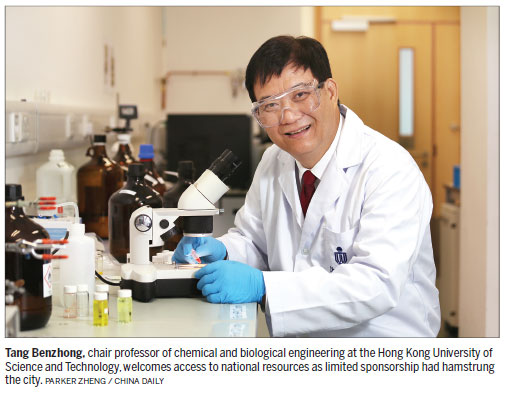Funding scheme hailed a 'big push' for scientific research
Updated: 2018-05-17 06:00
By Wang yuke in Hong Kong(HK Edition)
|
|||||||
President Xi Jinping's move to grant Hong Kong researchers national science funding is a "big push" for scientific research in the city, fostering a climate of research and innovation, said Tang Benzhong, chair professor of chemical and biological engineering at the Hong Kong University of Science and Technology.
Xi instructed central government departments to support Hong Kong's efforts to become an international innovation and technology hub.
Hong Kong has done well in basic scientific research but a lack of funding has been a persistent problem, said Tang.
"It's exciting news that Hong Kong scientists now can apply for and use the national funding in Hong Kong without limitations. We didn't expect it coming this early."

Many Hong Kong projects stalled by scarce funding could be picked up, generating a stream of research findings and innovations, Tang predicted.
"Scientific research relies heavily on a stable supply of funding, particularly so in big projects," said Tang, who has led research at the Hong Kong Branch of the Chinese National Engineering Research Center for Tissue Restoration and Reconstruction in HKUST.
National research funding is more generous and inclusive as it promises more sustainable support for scientists, he said.
Hong Kong's funding scheme lets researchers either obtain funds from the Research Grants Council to do academic research, or access Innovation and Technology Fund sponsorship to conduct applied scientific research, but the hefty national funding covers both areas, Tang explained.
"To some extent, Xi's move could incentivize the Hong Kong government to provide more support for local scientists."
Xi's instruction removes the cross-boundary funding usage barrier that has troubled Hong Kong scientists. Previously, Hong Kong scientists could use national research funds only if they had a laboratory on the mainland and operated there. Now the funds can be used within the SAR.
Tang's research center will benefit directly, with 1 million yuan ($157,000) which, he said, would be utilized to hire researchers, purchase equipment and subsidize the mainland team coming to Hong Kong for short-term exchange.
"In the past, it was always our team that traveled to visit our mainland partners. Scientific exchange should be dual-way. With the fund, we can support our mainland researchers to stay in Hong Kong for a short period of time."
Tang has spearheaded research into aggregation-induced emission, which has potential application in long-term tracking and visualizing of tumor tissues or cancer cells, as well as high-sensitivity detection and forecast. Tang was awarded the State Natural Science Award (First Class) last year in recognition of his achievements on aggregation-induced emission research.
Having closely collaborated with mainland research institutes and hospitals, Tang acknowledges the mainland has abundant resources in terms of healthcare, clinical practice and laboratory experiments. "The favorable funding initiative allows us easy access to these resources and put the mainland's advantages into full use."
Tang hopes that more research institutes can be set up at Hong Kong Science Park and the future Hong Kong-Shenzhen Innovation and Technology Park in the Lok Ma Chau Loop, where research fellows and postgraduates can advance their research.
Since Hong Kong scientists are offered the same opportunities as their mainland counterparts to apply for national funding, competition is bound to be fierce, said Tang. "But I'm sure it will be a wholesome competition, conducive to fostering a scientific innovation environment across the country."
jenny@chinadailyhk.com

(HK Edition 05/17/2018 page4)